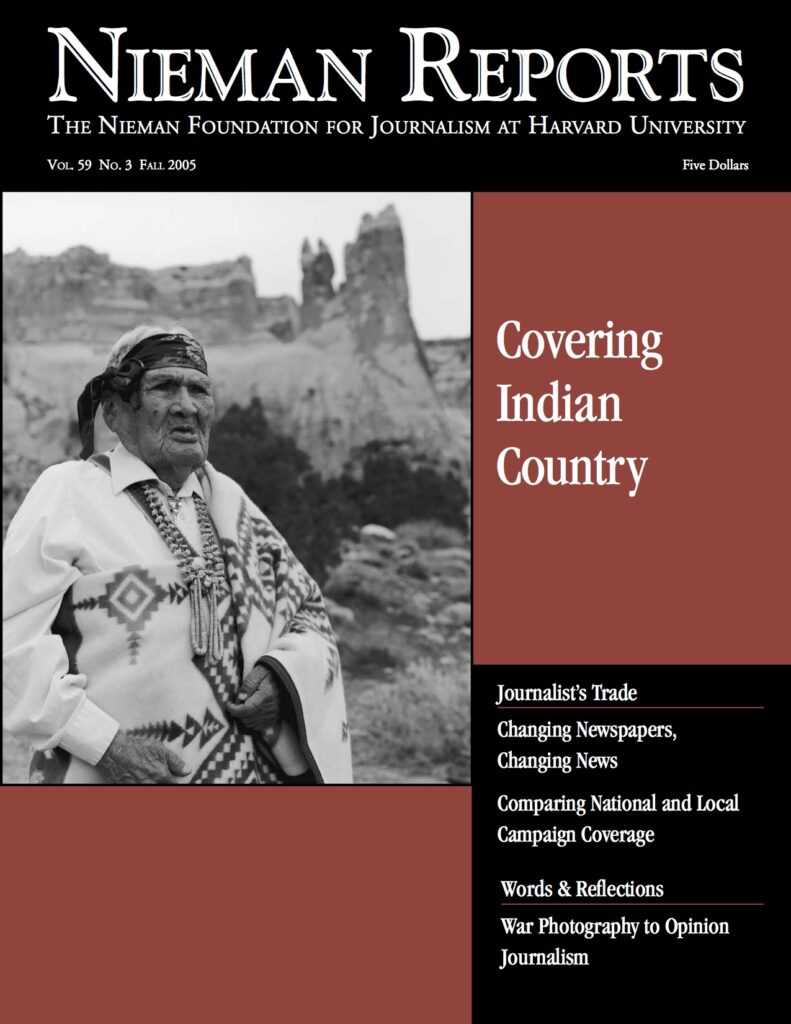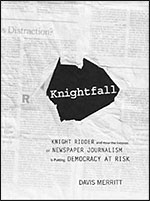Knightfall is the cri de coeur of an idealistic journalist who witnessed, in the latter part of a 42-year career, his employer’s brand of public-service/public-trust journalism undermined by a focus on profit margins and stock price.
Davis “Buzz” Merritt, former editor of The Wichita Eagle, says his account is not the history of Knight Ridder but rather a story about the company “told by an informed participant/observer.” Actually, it’s a story in microcosm of journalism generally during an era hit with the double whammy of consolidation and the shortsighted decision by media executives to “go public” and thus be judged in the marketplace by the unforgiving standards of Wall Street.
By Merritt’s count, more than two-dozen Knight Ridder editors and publishers left the company in the latter 1990’s because they could not adapt to the new countinghouse culture. The same disaffection has been evident virtually industrywide, though likely more so in the publicly traded newspaper sector. I know that I encountered many Buzz Merritts during the research we did for “Taking Stock: Journalism and the Publicly Traded Newspaper Company,” a book I wrote with Randall Bezanson and John Soloski that was published in 2001. The dejection so evident in Knightfall was for me a replay of the widespread gloom I encountered among the 50 editors at publicly owned papers who were interviewed at random for the study. What follows is a composite of their complaints:
To most of the editors who expressed their frustrations, I was a stranger, a disembodied voice on the telephone. They unburdened themselves in part because they trusted the pledge of anonymity I was obliged to offer in exchange for candor, but mostly, I suspect, because of deep-seated anxiety about the direction in which journalism was headed.
Given the discontent, why haven’t there been more “Knightfalls”? Perhaps because disheartened editors are by now a familiar story. Then, too, accounts of troubled newsrooms also virtually require prescriptions for reform, but realistic solutions to the problems newspaper editors face nowadays are elusive at best. There might well be very few with a chance to be implemented. Merritt, for one, candidly acknowledges that “Knightfall” cannot “provide the answers to the difficult underlying questions of how the current state of affairs could have been avoided and what now needs to happen.”
RELATED ARTICLE
"Recommendations From the Ad Hoc Committee on the Press"
- Gilbert CranbergThe experience in 2002 of the low-profile Ad Hoc Committee on the Press is instructive. The committee, comprised of nine well-known journalists, was organized to present newspaper company CEO’s and directors with concrete measures they could take to put quality ahead of profits and so reshape the organizations to have them look and behave like institutions engaged distinctively in journalism instead of just profit-driven corporations.
Those who signed on to the committee’s report were Hodding Carter, Bob Giles, Max King, Bill Kovach, Dave Lawrence, Jim Naughton, Geneva Overholser, Gene Patterson, and Gene Roberts. Individually and collectively, they’re of such stature in journalism that one would think they could not be ignored. For the most part, however, they were.
Responses were invited, but not a single director contacted in the 14 publicly traded companies responded. Only three CEO’s, and a representative of a fourth, answered. One of the respondents expressed general agreement, while two CEO’s took strong exception to the suggestion that directors have a hand in assuring the quality of a company’s journalism.
Stock analysts, who told me in interviews that they focus on the quality of newspaper company financial reports rather than their publications (they seldom read them), assuredly can’t be expected to pick up where the Ad Hoc Committee left off. Nor can investors or, for that matter, advertisers or readers. That leaves journalists, present and former, to advocate for quality journalism, but anyone drawing a paycheck has a powerful disincentive to speak up publicly, although a few brave souls now and then chance it.
It’s perverse that, in the land of the free, a person has to leave a newspaper company to speak candidly about journalism in a way that hits close to home. It’s difficult, for example, to imagine John Curley saying, before he retired as Gannett CEO, what he was reported to have said afterwards, namely that “some of the chains would do well to tell Wall Street that they’ve done all they can to improve the bottom line and focus instead on producing a quality news product for their subscribers.”
Well, better late than not at all. So let there be more tales from the trenches like “Knightfall.” Above all, let there be more people in newspaper boardrooms prepared to act on the conviction that journalism serves a far more crucial public purpose than piling up profits and upping stock prices.
Gilbert Cranberg, former editor of the Des Moines Register’s editorial pages, is George H. Gallup professor emeritus at the University of Iowa and coauthor of “Taking Stock: Journalism and the Publicly Traded Newspaper Company.”
Davis “Buzz” Merritt, former editor of The Wichita Eagle, says his account is not the history of Knight Ridder but rather a story about the company “told by an informed participant/observer.” Actually, it’s a story in microcosm of journalism generally during an era hit with the double whammy of consolidation and the shortsighted decision by media executives to “go public” and thus be judged in the marketplace by the unforgiving standards of Wall Street.
By Merritt’s count, more than two-dozen Knight Ridder editors and publishers left the company in the latter 1990’s because they could not adapt to the new countinghouse culture. The same disaffection has been evident virtually industrywide, though likely more so in the publicly traded newspaper sector. I know that I encountered many Buzz Merritts during the research we did for “Taking Stock: Journalism and the Publicly Traded Newspaper Company,” a book I wrote with Randall Bezanson and John Soloski that was published in 2001. The dejection so evident in Knightfall was for me a replay of the widespread gloom I encountered among the 50 editors at publicly owned papers who were interviewed at random for the study. What follows is a composite of their complaints:
- “Before, journalistic quality was the only consideration, now it’s not.”
- “The point corporate misses is how not proposing things because of cost inhibits creative thinking and what it does to ‘soul’—the really big things, the story you decide not to do in-depth, the constant turnover due to ‘atrocious’ pay, the errors because of being short of people on the copy desk, the stories that go uncovered because of vacancies that can’t be filled.”
- “You write about car dealers very carefully; home builders also are big advertisers, so the publisher wants to see and soften those stories.”
- “The staff’s experience level reduced 50 percent in five years because of pay.”
- “It’s always been true that being a journalist is like being on an expedition—every day, you make do with what you have,” but there’s “more quarterly pressure now” and delayed investment.
- “I put in things [in the newsroom budget] they can cut out. I hope they buy more papers so they’re too busy to nitpick. They put me through agony. Why do you need this and need that?”
- “I became an editor because I wanted to do journalism, but now it’s about the bottom line.”
To most of the editors who expressed their frustrations, I was a stranger, a disembodied voice on the telephone. They unburdened themselves in part because they trusted the pledge of anonymity I was obliged to offer in exchange for candor, but mostly, I suspect, because of deep-seated anxiety about the direction in which journalism was headed.
Given the discontent, why haven’t there been more “Knightfalls”? Perhaps because disheartened editors are by now a familiar story. Then, too, accounts of troubled newsrooms also virtually require prescriptions for reform, but realistic solutions to the problems newspaper editors face nowadays are elusive at best. There might well be very few with a chance to be implemented. Merritt, for one, candidly acknowledges that “Knightfall” cannot “provide the answers to the difficult underlying questions of how the current state of affairs could have been avoided and what now needs to happen.”
RELATED ARTICLE
"Recommendations From the Ad Hoc Committee on the Press"
- Gilbert CranbergThe experience in 2002 of the low-profile Ad Hoc Committee on the Press is instructive. The committee, comprised of nine well-known journalists, was organized to present newspaper company CEO’s and directors with concrete measures they could take to put quality ahead of profits and so reshape the organizations to have them look and behave like institutions engaged distinctively in journalism instead of just profit-driven corporations.
Those who signed on to the committee’s report were Hodding Carter, Bob Giles, Max King, Bill Kovach, Dave Lawrence, Jim Naughton, Geneva Overholser, Gene Patterson, and Gene Roberts. Individually and collectively, they’re of such stature in journalism that one would think they could not be ignored. For the most part, however, they were.
Responses were invited, but not a single director contacted in the 14 publicly traded companies responded. Only three CEO’s, and a representative of a fourth, answered. One of the respondents expressed general agreement, while two CEO’s took strong exception to the suggestion that directors have a hand in assuring the quality of a company’s journalism.
Stock analysts, who told me in interviews that they focus on the quality of newspaper company financial reports rather than their publications (they seldom read them), assuredly can’t be expected to pick up where the Ad Hoc Committee left off. Nor can investors or, for that matter, advertisers or readers. That leaves journalists, present and former, to advocate for quality journalism, but anyone drawing a paycheck has a powerful disincentive to speak up publicly, although a few brave souls now and then chance it.
It’s perverse that, in the land of the free, a person has to leave a newspaper company to speak candidly about journalism in a way that hits close to home. It’s difficult, for example, to imagine John Curley saying, before he retired as Gannett CEO, what he was reported to have said afterwards, namely that “some of the chains would do well to tell Wall Street that they’ve done all they can to improve the bottom line and focus instead on producing a quality news product for their subscribers.”
Well, better late than not at all. So let there be more tales from the trenches like “Knightfall.” Above all, let there be more people in newspaper boardrooms prepared to act on the conviction that journalism serves a far more crucial public purpose than piling up profits and upping stock prices.
Gilbert Cranberg, former editor of the Des Moines Register’s editorial pages, is George H. Gallup professor emeritus at the University of Iowa and coauthor of “Taking Stock: Journalism and the Publicly Traded Newspaper Company.”




